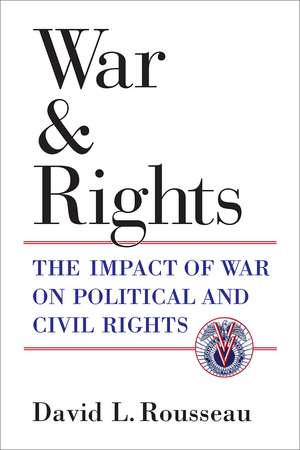War and Rights: The Impact of War on Political and Civil Rights
Autor David L Rousseauen Limba Engleză Hardback – 12 apr 2021
Warfare in Europe contributed to the development of the modern state. In response to external conflict, state leaders raised armies and defended borders. The centralization of power, the development of bureaucracies, and the integration of economies all maximized revenue to support war. But how does a persistent external threat affect the development of a strong state? The “Garrison State” hypothesis argues that states that face a severe security threat will become autocracies. Conversely, the “Extraction School,” argues that warfare indirectly promotes the development of democratic institutions.
Execution of large-scale war requires the mobilization of resources and usually reluctant populations. In most cases, leaders must extend economic or political rights in exchange for resolving the crisis. Large-scale warfare thus expands political participation in the long run. The authors use empirical statistical modeling to show that war decreases rights in the short term, but the longer and bigger a war gets, the rights of the citizenry expand with the conflict. The authors test this argument through historical case studies—Imperial Russia, Austro-Hungarian Dual Monarchy, African Americans in World War I and II, and the Tirailleurs Senegalese in World War I—through the use of large-N statistical studies—Europe 1900–50 and Global 1893–2011—and survey data. The results identify when, where, and how war can lead to the expansion of political rights.
Execution of large-scale war requires the mobilization of resources and usually reluctant populations. In most cases, leaders must extend economic or political rights in exchange for resolving the crisis. Large-scale warfare thus expands political participation in the long run. The authors use empirical statistical modeling to show that war decreases rights in the short term, but the longer and bigger a war gets, the rights of the citizenry expand with the conflict. The authors test this argument through historical case studies—Imperial Russia, Austro-Hungarian Dual Monarchy, African Americans in World War I and II, and the Tirailleurs Senegalese in World War I—through the use of large-N statistical studies—Europe 1900–50 and Global 1893–2011—and survey data. The results identify when, where, and how war can lead to the expansion of political rights.
Preț: 469.54 lei
Preț vechi: 609.79 lei
-23% Nou
Puncte Express: 704
Preț estimativ în valută:
89.89€ • 92.44$ • 74.57£
89.89€ • 92.44$ • 74.57£
Carte indisponibilă temporar
Doresc să fiu notificat când acest titlu va fi disponibil:
Se trimite...
Preluare comenzi: 021 569.72.76
Specificații
ISBN-13: 9780472132461
ISBN-10: 0472132466
Pagini: 332
Ilustrații: 14 figures, 43 tables
Dimensiuni: 152 x 229 x 25 mm
Greutate: 0.58 kg
Editura: UNIVERSITY OF MICHIGAN PRESS
Colecția University of Michigan Press
ISBN-10: 0472132466
Pagini: 332
Ilustrații: 14 figures, 43 tables
Dimensiuni: 152 x 229 x 25 mm
Greutate: 0.58 kg
Editura: UNIVERSITY OF MICHIGAN PRESS
Colecția University of Michigan Press
Notă biografică
David L. Rousseau is Associate Professor in the Department of Political Science and the College of Emergency Preparedness, Homeland Security and Cybersecurity at SUNY Albany.
Descriere
Long wars foster democratic freedom in strong states
